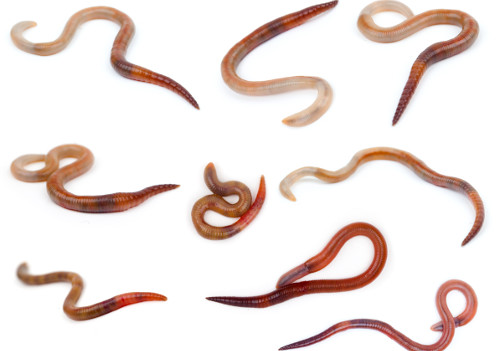Organic Composting with Red Wiggler Worms - Increase Your Garden's Development
Organic Composting with Red Wiggler Worms - Increase Your Garden's Development
Blog Article
Red Wiggler Worms Demystified: Opening the Keys of Vermiculture for Greener Living and Nutrient-Rich Soil
In the realm of lasting methods for enriching dirt top quality and promoting eco-conscious living, red wiggler worms play a pivotal yet typically forgotten duty. Red Wiggler Worms. Recognizing the ins and outs of caring for these worms, optimizing their environment, and utilizing their spreadings can lead to a greener way of living and healthier dirt for plants to prosper.
The Function of Red Wiggler Worms
Red Wiggler worms play a crucial duty in composting systems by efficiently damaging down raw material right into nutrient-rich castings. These starved eaters eat a variety of organic materials, such as cooking area scraps, yard waste, and paper items. As they feed, the worms' digestive system processes break down the raw material into a fine, dark, and nutrient-dense product recognized as worm castings or vermicompost.
The spreadings produced by Red Wiggler worms are extremely advantageous for dirt wellness and plant development. They are rich in necessary nutrients like phosphorus, potassium, and nitrogen, which are essential for sustaining healthy and balanced plant growth. In addition, worm spreadings contain advantageous microorganisms and enzymes that assist enhance soil structure, boost water retention, and improve nutrient uptake by plants.
Benefits of Vermicomposting

It improves dirt framework, improves soil oygenation, and increases soil moisture retention. Vermicompost additionally enriches the soil with crucial nutrients like potassium, phosphorus, and nitrogen, promoting plant growth and general soil fertility.
Additionally, vermicomposting supports lasting horticulture techniques by supplying a natural and chemical-free alternative to synthetic fertilizers. Red Wiggler Worms. This eco pleasant technique not just improves the dirt but also helps in reducing dependence on dangerous chemicals, advertising a greener and much more sustainable method of horticulture
Establishing a Worm Container
When developing a worm container for vermicomposting, correct configuration is important to guarantee the success of the composting process. The initial step in setting up a worm container is selecting an ideal container.
After including the bedding, introduce the red wiggler worms to the container. The worms ought to after that be offered with food scraps such as fruit and veggie peels, coffee grounds, and eggshells.
On a regular basis monitor the moisture degrees and temperature in the worm container to ensure optimum conditions for the worms. With proper arrangement and maintenance, the worm container will effectively transform natural waste into nutrient-rich compost for your plants and yard.
Harvesting Worm Castings
To efficiently gather nutrient-rich worm castings from your vermicomposting system, a methodical harvesting approach is important. When it comes time to collect the worm castings, there are a few essential steps to follow to make sure an effective process.

Troubleshooting Common Issues
Recognizing and attending to common challenges that may arise during the vermicomposting procedure is crucial for keeping a healthy and balanced and effective worm bin. One usual concern that vermicomposters experience is overfeeding. Adding excess food scraps can cause an accumulation of moisture and level of acidity in the worm container, potentially harming the worms. To stop this, feed the worms in moderation, making sure that the food scraps are effectively broken down before including a lot more. Another concern is undesirable smells emanating from the worm bin. Foul scents suggest anaerobic problems, generally triggered by overwatering or inadequate ventilation. To fix this, adjust the dampness levels by including completely dry bed linen materials like shredded paper or cardboard and increase oygenation by turning the bed linens routinely.
Furthermore, if the worm populace is declining or the worms show up unhealthy, it might be as a result of ecological stressors such as severe temperature levels or pH levels. Checking these elements and making essential adjustments is necessary for the well-being of the worms. By fixing these common issues immediately, vermicomposters can ensure a effective and smooth vermicomposting procedure while maintaining a flourishing worm populace.

Conclusion
In verdict, red wiggler worms play a vital function in vermiculture by breaking down organic issue right into nutrient-rich soil. Establishing up a worm container is vital for successful vermiculture, and harvesting worm spreadings offers valuable garden compost for gardening.
As they feed, the worms' gastrointestinal procedures damage down the organic issue into a penalty, dark, and nutrient-dense product known as worm spreadings or vermicompost.
The castings generated by Red Wiggler worms are extremely useful for dirt health and wellness and plant growth. Including excess food scraps can lead to an accumulation of dampness and acidity in the worm bin, possibly hurting the worms.Furthermore, additional hints if the worm populace is declining or the worms appear undesirable, it could be due to ecological stressors such as severe temperature my response levels or pH degrees. Establishing up a worm bin is vital for effective vermiculture, and harvesting worm castings provides beneficial compost for horticulture.
Report this page